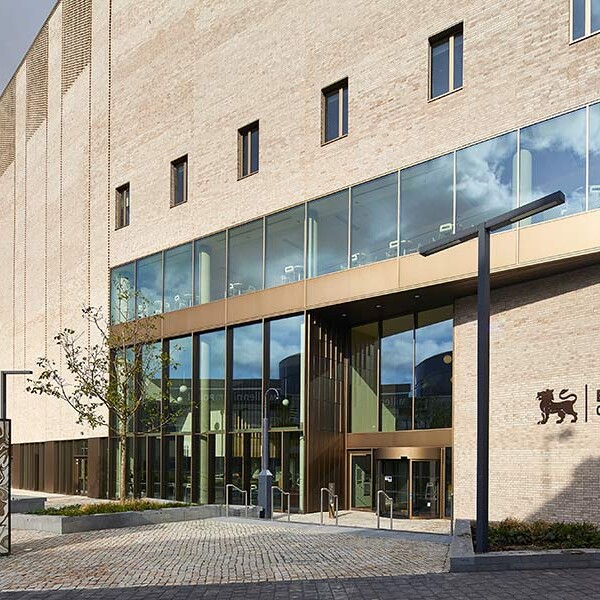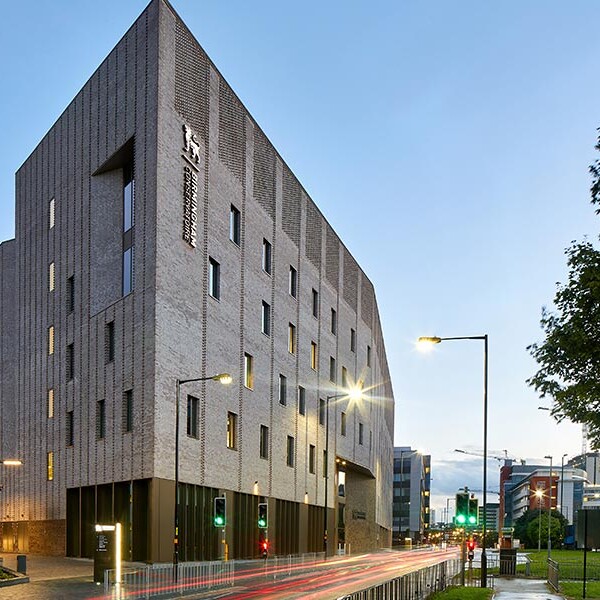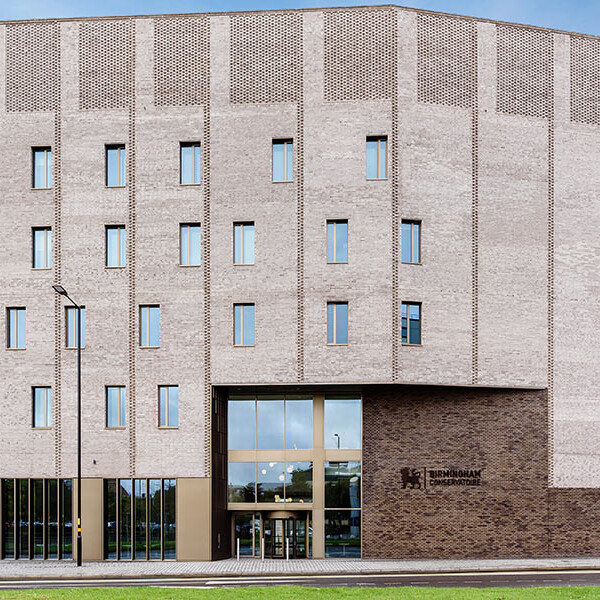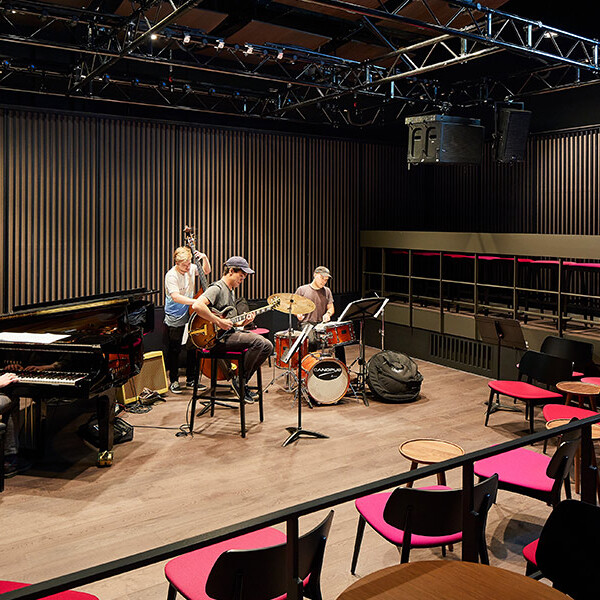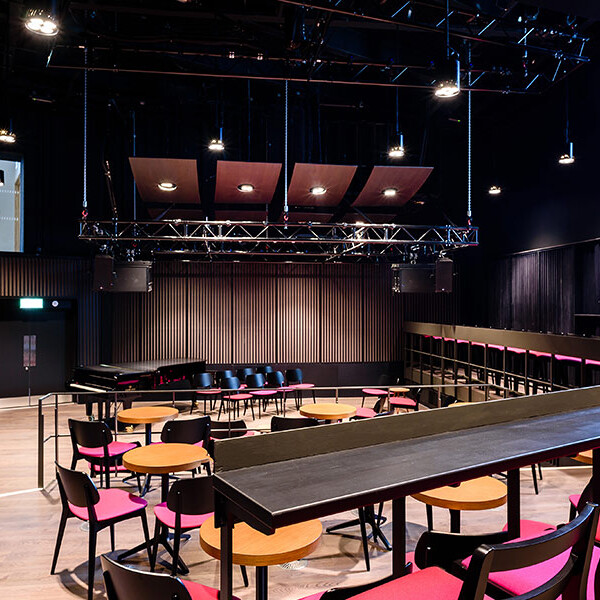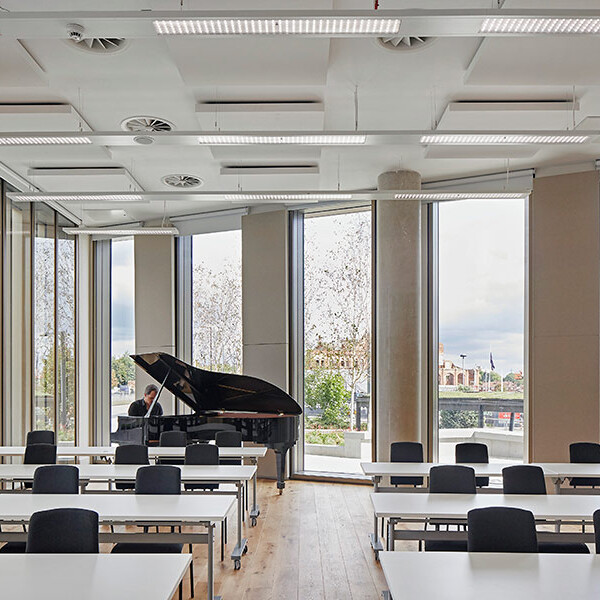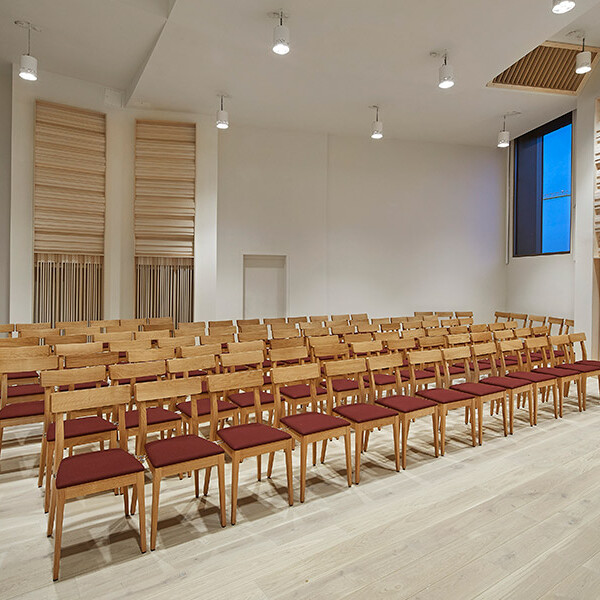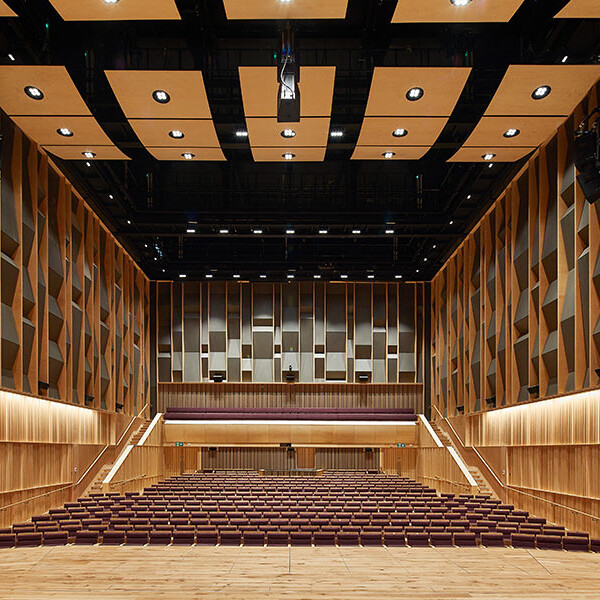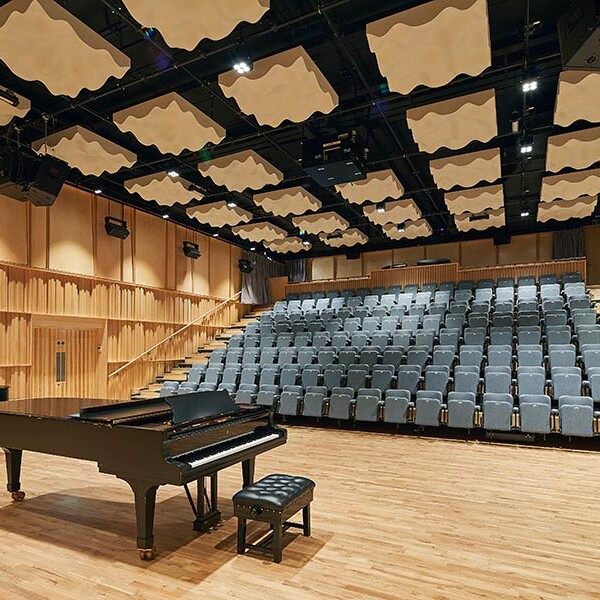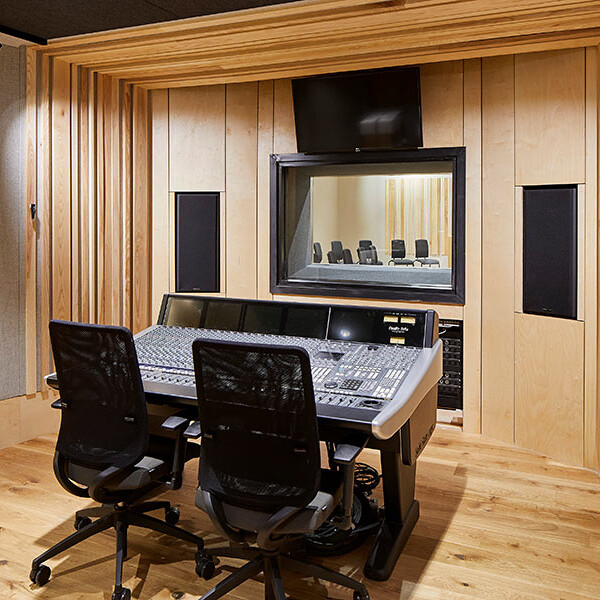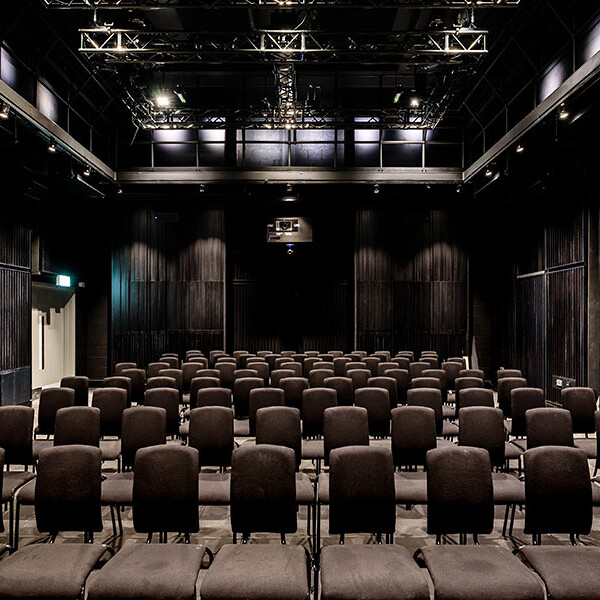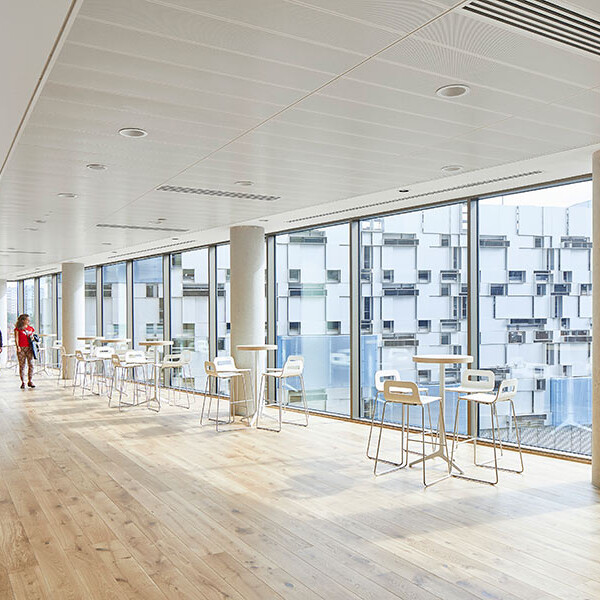Musicology - MA
Currently viewing course to start in 2025/26 Entry.
Our MA Musicology offers a gateway to developing your interests at postgraduate level and is not only for those who have an undergraduate music degree. Recent MA Musicologists have come from unrelated careers or are working musicians or teachers seeking another side to their interests. For others, the course is a stepping stone to PhD study, facilitating the development of a project and the opportunity to gain vital research skills within a supportive environment.
- Level Postgraduate Taught
- Study mode Full Time/Part Time
- Award MA
- Start date September 2025
- Fees View course fees
- Subject
- Location Royal Birmingham Conservatoire
This course is:
Open to International Students
Overview
Scholarships available to study this course. Apply before 28 April 2025 – 12pm noon GMT. Find out more
Whatever your interests, our Musicology course gives you the unique opportunity to pursue your own research project within a lively and exciting Conservatoire environment.
Our flexible course enables you to mould a programme of study to your own needs and aspirations, and may be approached as preparation for a research degree in music.
It is important that a musicologist also develops complementary skills and/or knowledge outside their specialism which will help equip them for a future career: professional musicologists typically find themselves, amongst other things, teaching, managing and administering; some even maintain parallel careers as professional performers or composers.
Therefore, we provide you with a choice of Professional Development Options (shared across our postgraduate programmes) alongside your musicological work to give you the opportunity to develop and/or expand your interests across a range of complementary areas.
The Conservatoire team—which comprises a large number of research-active staff—has a vast array of expertise, allowing us to supervise a wide range of projects, and we are particularly keen to attract those interested in pursuing Masters-level research in our specialist areas.
These include: Late Medieval Music; French Music of the 17th, 18th and 20th centuries; Italian Baroque Music; 18th and 19th Century British, Russian or Austro-Germanic Music; Contemporary Film and Television Music; Theory and Analysis; 20th-Century Music Theory and Analysis; and Music Critics and Criticism.
Royal Birmingham Conservatoire also hosts a significant collection of historical instruments and we welcome studies with a focus on performance practice and/or critical editing.
Recent research projects include:
- Florence B. Price: An exploration of European Tradition with African-American Heritage
- An Exploration of Music Performance Anxiety in a Conservatoire Woodwind Department
- Chopin’s Neglected Contemporaries: Charles-Laurent Rhein and Adolph von Henselt as Contributors to the Nineteenth-Century Piano Etude
- Critical Edition of Joseph Bologne, Chevalier de Saint George, Violin Concertos, Op. 7
- Easy Listening: Jerry Lanning and the BBC Radio Orchestra 1979-81
- Voices from a Non-Place: An Investigation into Language, Space and the Sung Voice
- The Lute and Non-Nobility in Elizabethan England
- Alexei Stanchinsky (1888-1914): Context and Influences
- Clara Schumann as Pedagogue
- Italian Film Music During the 1930s: Political Appropriation and Socioeconomic Agendas
- Constructive or Destructive? Assessing the Impact of Feedback in Instrumental Piano Lessons
- The Pianist-Composer Alexis Weissenberg
- Ravel and his Aesthetic of the Macabre
- A Handsworth Revolution: The Development of a Birmingham Reggae Sound
- “A Master of his Profession”: Carlo Bassini and the training of the female voice, 1840-1870
- Zooming forward: the implications of online learning environments on pain-free piano pedagogy
- Understanding Leschetizky: The Methodologies, Approach, And Relevancy Of A 19th Century Pedagogue In The 21st Century
- “Rise like a phoenix, out of the ashes.” The Eurovision Song Contest and LGBTQ representation.
- Augmenting Interaction: Exploring the Effect of Haptic Feedback on the Experience of Installation Audio
Our MA Musicology course can be studied as a standalone course, but it is also intended to help prepare you for a research degree.
Please note we consider applications throughout the year for this course, it does not close for applications in October.
What's covered in this course?
Most postgraduate conservatoire degrees are focused on performance or composition, and don’t cater for musicologists. This is not the case at Royal Birmingham Conservatoire, where this course provides you with the opportunity not only to develop your skills as a musicologist, but to supplement them with complementary studies unique to a Conservatoire environment.
Your own research project will be at the heart of your course, and alongside this you will choose from the Conservatoire’s menu of postgraduate Professional Development options, which will allow you either to hone your skills in complementary areas, or to develop and expand your interests, providing the opportunity to interact and network with fellow musicians and a range of staff, as well as enjoying the excellent facilities the Conservatoire boasts.
You will benefit from the Conservatoire’s excellent library resources, as well as the opportunity to get involved with our performance departments, and our wider research community of students and staff through seminars, study days, social activities and other events.
Nina Djokic
Moving thousands of miles from home was always going to have its challenges, but despite this, Nina made the big decision to join BCU from Canada to complete her MA in Musicology. The experience has made her more confident in her own abilities.
Read in fullWhy Choose Us?
- The course is structured around your own research interests, and ensures you have the skills and knowledge needed to successfully complete your research project (as well as preparing you for PhD study, should you decide to progress).
- We’re ranked as the leading institution in the UK for research power and 100% of our research is internationally recognised for making an impact (REF 2021).
- You’ll be taught by a team of distinguished musicologists, many of whom are also experienced performers.
- You’ll have the flexibility to choose from a broad menu of Professional Development options, designed to help you work towards achieving your personal career aspirations.
- Royal Birmingham Conservatoire has some of the best music technology facilities in the country, and a brand new building.
- We are within easy travelling distance to the UK’s major research libraries and instrument collections.
Open Day
Join us on campus where you'll be able to explore our facilities and accommodation in person, and chat to staff and students from the Royal Birmingham Conservatoire.
Next Open Day: 12 June 2025
Entry Requirements
Essential requirements
UK students should normally hold a 2:1 honours degree, ideally but not necessarily in Music.
Non-UK students should hold a Bachelor's degree or a similar degree-equivalent diploma, ideally but not necessarily in Music.
All applicants will submit a proposal detailing ideas for their Dissertation project and this will be followed by an interview. Home student auditions will be scheduled live in Birmingham. EU/international students outside the UK at the time of application may participate in an online interview.
Applying with international qualifications
See below for further information on applying as an international student.
If you have a qualification that is not listed, please contact us.
Fees & How to Apply
UK students
Annual and modular tuition fees shown are applicable to the first year of study. The University reserves the right to increase fees for subsequent years of study in line with increases in inflation (capped at 5%) or to reflect changes in Government funding policies or changes agreed by Parliament. View fees for continuing students.
Award: MA
Starting: Sep 2025
- Mode
- Duration
- Fees
- Full Time
- 1 year
- £10,000 in 2025/26
- Apply via UCAS
- Part Time
- 2 years
- Show fees
- Apply via UCAS
- £1112 per 20 credits
- Year 1 - 80 credits
- Year 2 - 100 credits
Fees for Part-time students
This course can be studied on a Part-time study basis. The cost per year of study is based on credit requirements for that year.
International students
Annual and modular tuition fees shown are applicable to the first year of study. The University reserves the right to increase fees for subsequent years of study in line with increases in inflation (capped at 5%) or to reflect changes in Government funding policies or changes agreed by Parliament. View fees for continuing students.
Applications are still open for September 2025. Apply now
*Professional Placement option
The Professional Placement version of the course is optional and is offered as an alternative to the standard version of the course. However, it is not possible to apply for direct entry to the Professional Placement version of the course since the decision to transfer may only be taken after consultation with your course tutors and after successfully completing at least 120 credits.
Completing a 20-week Professional Placement towards the end of your Masters degree enables you to further improve your employability skills which will, through the placement experience, allow you to evidence your professional skills, attitudes and behaviours at the point of entry to the postgraduate job market. Furthermore, by completing the Professional Placement, you will be able to develop and enhance your understanding of the professional work environment, relevant to your chosen field of study, and reflect critically on your own professional skills development within the workplace.
You will be responsible for finding and securing your own placement. The University, however, will draw on its extensive network of local, regional and national employers to support you in finding a suitable placement to complement your chosen area of study. You will also benefit from support sessions delivered by Careers+ as well as advice and guidance from staff in your subject area.
Placements will only be confirmed following a competitive, employer-led selection process, therefore the University will not be able to guarantee placements for students who have registered for the ‘with Professional Placement’ course. All students who do not find a suitable placement or do not pass the competitive selection process will be automatically transferred back to the standard, non-placement version of the course.
Please note that tuition fees are payable during your placement period.
Completing your application
Further information on writing your personal statement can be found on the UCAS Conservatoires website.
International postgraduate scholarships available worth up to £33,500
Two scholarships from the Allan & Nesta Ferguson Charitable Trust, each worth up to £33,500 (to cover tuition fees and stipend), are available for students from Africa, India or South America undertaking a 12-month programme of postgraduate study.
Course in Depth
MA
In order to complete this course a student must successfully complete all the following CORE modules (totalling 140 credits):
Members of the music profession require not only high-level specialist skills but also the ability to target those skills strategically to different circumstances. This module focuses on a range of different aspects of a musician’s professional development that directly relate to the music industry and their preparation for it: from self-promotion and self-management, to funding and wellbeing. It is thus central to a programme which aims to prepare you for a career as a musician in the 21st century.
It requires you, near the beginning of your postgraduate studies, to reflect ambitiously yet realistically on your professional aspirations, and to formulate a plan that helps you stand the best chance of achieving your goals. Weekly workshops, delivered by internal staff and external professionals, will focus on the practicalities of a career in music, providing you with a better insight into the industry you will be entering, as well as encouraging you to be self-reflective about your own personal and professional development needs.
This module is designed to develop your understanding of the world of musicology by introducing you to its key concepts and theoretical foundations, providing you with a broad knowledge of the field, including key areas of discourse and development, and enabling you to contextualise your own research or practice. This module will provide you with the knowledge and skills to engage critically with relevant scholarship, construct effective and well-supported arguments, and develop transferrable skills, including self-direction, critical reading and thinking, organization and time management – all of which will be useful beyond the end of your programme.
For MA Musicologists, this is a core module and will provide important training for your Dissertation. You will develop advanced research skills, and a broad knowledge of the field of musicology, facilitating the contextualisation and critical engagement of your Dissertation, and enabling you to engage with the key arguments and theories relevant to your own research projects, drawing upon complementary studies as and when appropriate.
MA Musicology culminates in the submission of a Dissertation, in which you will demonstrate command of your field of study, critical engagement with existing scholarship as a context for your independent research, an ability to work autonomously to formulate and develop an extended research project, and effective communication of your research findings. Effective verbal communication of your research – particularly through a conference-style paper – is an essential tool for a musicologist. Likewise, a knowledge and understanding of the style, function and purpose of conferences is also valuable. As a musicologist, attending and delivering papers at conferences will likely become a feature of your professional life, particularly if you wish to continue your studies to doctoral level and beyond. As such, experience of, and practice in, this discipline will be helpful to your continued development.
This module will equip you with the skills and knowledge to successfully write and deliver your own conference paper on your chosen area of research. This will be given at the Conservatoire’s biannual Postgraduate Research Study Day in the summer exam period, enabling you to present your research within a supportive conference environment, albeit one which mimics the professional context.
This module works in conjunction with Concepts in Musicology to assist the formation, contextualisation and preliminary stages of work on your Dissertation. As your initial research progresses, and your subject area and research questions become more defined, this module supports you in formulating and structuring your ideas into a proposal fit for formal scrutiny. The submission, including a literature review – in which you will critically evaluate and contextualise existing scholarship within your research area – will provide you with the opportunity to exercise your written presentation skills, receive formal feedback on your proposed Dissertation, and will result in the formulation of a strong research project that will be a feasible undertaking within the given time, demonstrating appropriate methodology.
The Dissertation is the culmination of the MA Musicology course. The purpose of this module is to enable you to undertake a sustained, in-depth and theoretically-informed research project by exploring an area that is of personal interest to you. Thus, the content of this module is determined by your individual research interests. The outcome may take the form of a written Dissertation, a Scholarly Edition or a Musicological Equivalent, and will be discussed in consultation with your supervisor(s). Through this module, you will demonstrate command of your chosen field of study by critically engaging with existing scholarship as a context for your own independent research, work autonomously to formulate and develop an extended research project, and develop the skills necessary to present your research findings effectively. Among the transferable skills developed here are self-direction, self-motivation, initiative-taking, problem-solving and decision-making, all of which are essential if you intend to pursue musicological research further, whether independently, in the context of employment, or in a future PhD project, the latter being a logical progression for a student who is particularly successful in this module.
In order to complete this course a student must successfully complete at least 40 credits from the following indicative list of OPTIONAL modules.
Optional modules (40 credits each)
- Research Project
- Critical Edition
- Lecture-Recital
- The Reflective Practitioner
- There are two pathways through this module: 1. Professional Placement, and 2. Creative Interdisciplinary Artist.
OR two of the following Professional Development Modules:
Professional Development modules (20 credits each)
Conservatoire based
- Concepts in Musicology
- Contemporary Music Concepts and Practice
- Music Technology in Performance
- Critical Editing Techniques
- Documentation
- Experimental Performance in Context(s)
- Historical Instrument Performance
- Historical Performance Practice
- Independent Scholarship in Music
- Music and Ideas
- Music Technology in Context
- Orchestration
- Performing and Producing in the Studio
- Professional Music Criticism
- Self-Promotion Project
- Teaching Matters: Principles and Practice
- Work Placement
- Writing Music for Media
- Music, Community and Wellbeing (BMus module)
Art based
- Art and Ecologies
- Contemporary Philosophy and Aesthetics
- Discourses in Art and Design
- Models and Methods of Curatorial Practice
- Queer Strategies in Practice
- Small Arts Business Set Up
- Social Practice in the Visual
Media based
- Live Events and Festival Management
- Social Media as Culture and Practice
Core modules are guaranteed to run. Optional modules will vary from year to year and the published list is indicative only.
Download course specification
Download nowCourse structure
You will learn through a variety of methods, ranging from one-to-one and small-group tutorials to workshops, seminars, lectures and independent study. Support for your research project will be provided by a supervisor/s who will help guide you as you develop your skills as an independent researcher.
As you would expect of a Musicology programme, it culminates in the submission of a dissertation or musicological equivalent, where you present your research project. Preparation for this includes the earlier submission of a proposal and literature review, and presentation of an aspect of your research in the form of a conference paper given at the Conservatoire’s biannual Postgraduate Research Study Day. Alongside this, you will develop your understanding of the world of musicology, exploring key concepts and theoretical foundations. The Career Development module requires you near the beginning of your course, to reflect ambitiously yet realistically on your professional aspirations, and to formulate a plan that helps you stand the best chance of achieving your goals. You will also choose, in addition, some modules from a varied list. The Professional Development options are assessed by a variety of mechanisms appropriate to the nature of the individual modules, including essays, presentations, portfolios, live performance and sound recording.
The following gives an indication of the kind of optional modules which may be offered in a given year, including some offered by Art and Media at Birmingham City University (note, not all will run every year).
Conservatoire based
- Contemporary Music Concepts and Practice
- Music Technology in Performance
- Critical Editing Techniques
- Documentation
- Experimental Performance in Context(s)
- Historical Instrument Performance
- Historical Performance Practice
- Independent Scholarship in Music
- Music, Community and Wellbeing
- Music and Ideas
- Music Technology in Context
- Orchestration
- Performing and Producing in the Studio
- Professional Music Criticism
- Self-Promotion Project
- Teaching Matters: Principles and Practice
- Work Experience Project
- Writing Music for Media
Art based
- Art and Ecologies
- Contemporary Philosophy and Aesthetics
- Discourses in Art and Design
- Models and Methods of Curatorial Practice
- Queer Strategies in Practice
- Small Arts Business Set Up
- Social Practice in the Visual Arts
Media based
- Live Events and Festival Management
- Social Media as Culture and Practice
You'll be supported in making your module choices: starting in Welcome Week and continuing for one week beyond that will be an extended period of induction and counselling for all new postgraduate students, at which point you will be assigned a Personal Tutor from within the postgraduate course team.
During this period, you'll be encouraged to discuss your career aspirations, and to reflect on what choices you can make within your course to equip you with skills/knowledge relevant to those aspirations.
This process will take place through course meetings and information sessions, as well as small group and individual tutorials, and will be aimed at ensuring that you can make informed decisions in relation to your course choices.
Part-time options
There is some room for negotiation in how the course unfolds for a part-time MA Musicology student over two years.
Employability
Enhancing employability prospects
Our aim is to prepare you for employment, giving you the knowledge, skills and confidence to succeed in your chosen branch of the music profession. This will give you a head-start in meeting the challenges involved in becoming a professional musician in the 21st century.
We also offer you guidance in making choices on your programme by encouraging you to consider your future plans, as well as your priorities. This will ensure that your decisions are strategic in relation to your professional development and future employability.
Facilities & Staff
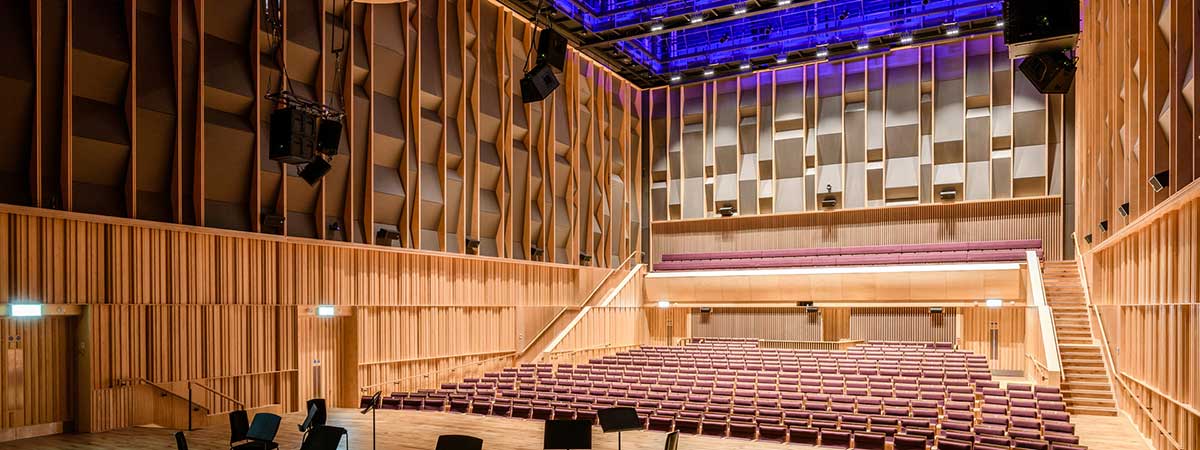
Royal Birmingham Conservatoire’s £57 million music building opened in September 2017, and is located on Birmingham City University’s City Centre Campus in the Eastside ‘learning quarter’ of the city.
This state-of-the-art music facility includes five public performance venues – a 440-seat Concert Hall, 150-seat Recital Hall, Organ Studio, Eastside Jazz Club and the experimental black box performance venue known as The Lab. As well as these stunning performance venues, we have nearly 100 practice spaces, including 70 small practice rooms and larger ensemble rooms and workshops.
Our home is the first conservatoire built in the digital age, and as such it has been vital to ensure that the technical infrastructure installed is on par with any advanced commercial facility. We have seven recording studios, a mastering suite, a distance learning hub, and all of our performance venues feature high specification audio-visual equipment that enables interconnectivity and advanced functionality throughout the building.
These impressive modern facilities guarantee that we are able to excel in our unique dual purpose of providing the highest standard of music education deserved by our students, as well as meeting our role as a concert and performance venue for the people of Birmingham, taking our place in the vibrant cultural landscape of the UK’s second city.
Our staff
Dr Siân Derry
Assistant Director of Postgraduate Studies (MA Musicology Course Director, Professional Performance - AdvPgDip Course Director)
Siân Derry is a Senior Lecturer in Music, and Assistant Director of Postgraduate Studies (MA Musicology Course Director, Professional Performance - AdvPgDip Course Director) at Royal Birmingham Conservatoire. She joined the Conservatoire in 2015, having previously taught at the University of Manchester. Siân completed her BMus Hons degree...
More about SiânDr Luan Shaw
Associate Professor (Music Education), Director of Postgraduate Studies (Music), and Associate Head of Junior Conservatoire
Dr Luan Shaw is Associate Professor (Music Education) and Director of Postgraduate Studies (Music) at Royal Birmingham Conservatoire where she has taught since 2011. She is also Associate Head of the Junior Department and leads Pedagogy provision across BMus 4 and postgraduate courses. She is a Senior Fellow of the Higher Education...
More about LuanDr Joanna Bullivant
Lecturer in Music
Joanna joined RBC in September 2023, having previously worked at the University of Oxford, the University of Nottingham, and King’s College London. Joanna’s research centres on nineteenth- and twentieth-century British music, particularly musical and cultural histories of minority groups.
More about Joanna













